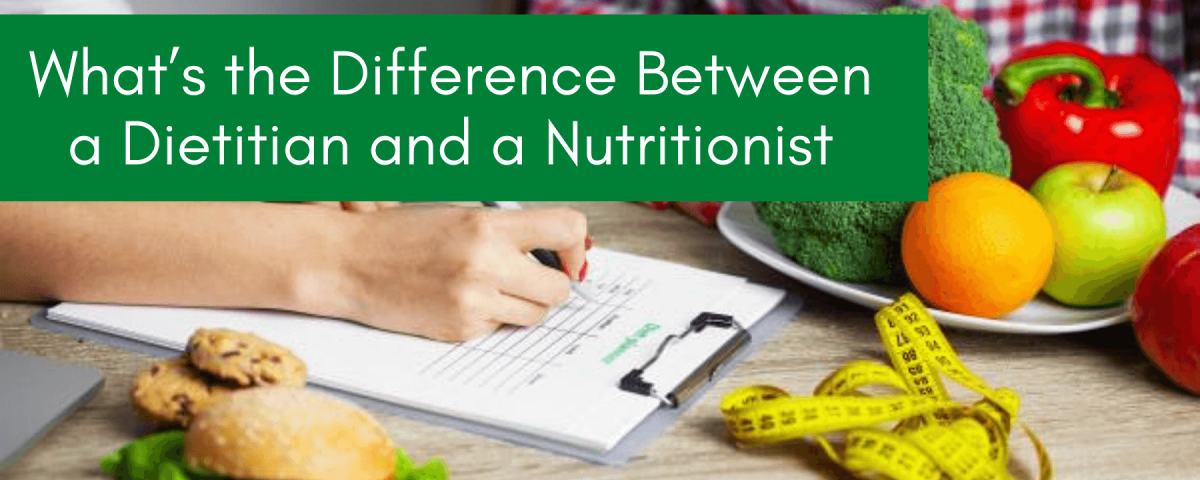What’s the Difference Between Dietitian and Nutritionist?

Eat Indian Food Diet Plan For Postpartum Weight Loss That Actually Works
January 29, 2021
Thyroid Natural Treatment – Foods That Fights Hypothyroidism Naturally
January 29, 2021What you eat can have a big impact on your health. The correct diet will help to stabilize the levels of blood sugar, blood pressure and cholesterol. Healthy eating will maintain one at a perfect weight too. But it’s more than just eating the right foods (fruits, vegetables, grains, protein, some dairy) and staying away from others (fried foods, food high in salt, sweets, drinks high in sugar). How much you eat — and how often — can be important, too.
And often we look for experts in these fields to get that guidance. But perhaps you’ve heard the terms “nutritionist” and “dietitian” while looking for one and are confused by what they mean. What are their differences? How different is their work from one another? And most importantly, who should you be going to for diet advice? You may wonder what defines true nutritional expertise-how. This article will explain the differences between nutritionists and dietitians and what they do
Nutritionists and dietitians are both nutrition experts who have studied how diet and dietary supplements can significantly impact your health. Both are considered professionals in the health care sector, but the titles use different meanings and very different professions. A registered dietitian (RD) or registered dietitian nutritionist (RDN) — they’re the same thing — is a specialist trained to help you come up with a diet plan and all those things. But to whom you should go for depends on your health conditions.
What does a Dietitian do?
A dietitian is a diet specialist, a branch of expertise concerned with diet and its health effects. A dietitian may typically work with a person to adjust their lifestyle based on a medical condition and/or specific objectives.
Dietitians don’t just follow the latest dietary trends and give their patients standardized recommendations. Rather, they develop diet and nutrition programmes, tailored to the goals and personal needs of an individual. We often assume, however, that dieticians work only at their health clinic, but dietitians do not only work with individual clients; they also work with industry stakeholders to ensure that best health and nutritional practices are followed.
Dietitians help to improve more than just a person’s health by working with
- Work with Doctors: Improving people’s eating habits with complex health problems
- Policymakers: Help the government create health strategies for citizens at all levels
- Leaders in the industry: consulting about food systems, food sustainability, food service management, processing and distribution
- Market researchers: To help researchers understand food science better
- Educators such as school teachers: teach the Dietitian profession to the students
Also Read: Healthy Diet Plan for Diabetic Person to Control Sugar Level
Numerous ladies with PCOS discover they’re ready to deal with their indications and diminish their danger of other clinical worries by controlling their eating routine and way of life decisions.
What do dietitians actually do in their day-to-day roles?
A dietitian is a licensed food and nutrition specialist. They are highly educated in the field of nutrition and diet — the science of food, nutrition, and their effect on human health. By specialized training, dietitians gain the experience to deliver evidence-based professional nutrition therapy and nutrition counselling customized to fulfil the individual’s needs.
They are eligible to work in a variety of work environments, including, to name a few, hospitals, medical services, research agencies, or local communities. Dietitians use their counselling and food sciences expertise to perform the following duties:
- Help individuals make healthy food choices
- Influence food-related policy developments
- Educate individuals, governments, education facilities, and industries on nutrition programs
- Assist to manage quality food services in public and private establishments
- Conduct nutrition research
- Create diet plans for individuals with health conditions such as diabetes, heart disease, cancer, allergies, and obesity
How to Become a Registered Dietitian (RD)

To get the title of Registered Dietitian (RD) or Registered Dietitian Nutritionist (RDN) credentials, a person must meet the requirements set out by governing bodies such as the Academy of Nutrition and Dietetics (AND). In fact, in some countries, people can receive the title of “registered nutritionist,” which is synonymous with “registered dietitian” and requires a governing body’s certification.
- A bachelor’s degree with coursework accredited by the Accreditation Council for Education in Nutrition and Dietetics Academy of Nutrition and Dietetics. This usually involves a college degree in science, including classes in genetics, microbiology, organic and inorganic chemistry, biochemistry, anatomy, and physiology, as well as more advanced nutrition research.
- Completed an approved, supervised practice program monitoring training at an approved healthcare facility, community organization, or food service company.
- Pass a national Dietetic Registration exam conducted by the Dietetic Registration Commission.
What Can You Expect From Your Visiting Dietician?
The doctor or nurse should refer you to an RD or RDN. The first visit will last from 45 minutes to 90 minutes. They are going to go over your medical history and think about the medications you’re taking. Sometimes, they will inquire about what kind of food you like and how healthy you are and she’ll help you set up regular meal plans that take into account all of that.
Based on your success and overall health you may need to make up to four follow-up appointments over the next 6 months. Every year you’ll have one after that. Some health programs, including Medicare, provide an RD or RDN for several sessions.
What does a Nutritionist do?

The title “nutritionist” applies to someone who gives general nutritional advice. Nutritionists are not as specialized as dietitians, and even those who have no formal training can be legally considered nutritionists themselves. Nutritionists deal with general nutritional requirements and patterns as compared to dietitians who are trained to diagnose eating disorders and devise diets to treat particular medical conditions. Nutritionists are often working at places like in schools, hospitals, cafeterias, and athletic organizations where they advise nutritional care to the other or healthy ones.
Nutritionists, unlike Dietitians, deal exclusively with individual clients. As a food and nutrition specialist, Nutritionists educate people about how to lead a healthy lifestyle and accomplish health-related goals. The roles of nutritionists are as follows:
- Develop a personalized diet and workout schedule for the clients
- Support our clients through daily meetings
- Track the success of clients and inspire people to adhere to diet plans
- Helping to create health and wellness by presentations on the value of food safety
- Evaluate the general health of individuals including sleeping habits
Also Read: Best Meal Diet Plan For PCOD To Lose Weight by Nutritionists Priyatama Srivastava
How to Become a Nutritionist
Individuals who refer to themselves as nutritionists may have different levels of education – and may not have nutritional education at all at times. That is because there are no administrative bodies that regulate titles like:
- Nutritionist
- Health Coach
- Registered Nutritionist
- Wellness Coach
- Nutrition Specialist
Major Differences Between a Dietitian and a Nutritionist
Still, these two professions may sound very similar to each other, and their work and education around the same condition here are a few major differences between dieticians and nutritionists that will help you explain their distinct roles.
• Dietitians work with healthy and extra medical condition people while nutritionists are limited to work with healthy individuals
Dietitians are qualified professionals who encourage dietary health and use medical nutritional therapy to treat medical conditions. They also consult with people who are living with chronic illnesses and recommend improvements in diet. Dietitians should develop a detailed meal plan for anyone suffering from diabetes, high cholesterol or obesity to help control their condition.
On the other hand, nutritionists should not treat people with medical conditions and issues ( e.g., diabetics, people with high blood pressure, thyroid). Instead, they work primarily with healthier people who try to change their nutritious intake and lifestyle by making better decisions about their food.
• They study similar subjects in the beginning, but they deviate from the later part of the degree
At first, courses in nutrition and dietetics follow a common curricular design. You will take modules like anatomy and physiology, genetics, microbiology, food science and diet preparedness from the two programmes.
In later years, nutrition students will dive further into nutrition courses, nutrition program preparation and evaluation learning, nutrition education and promotion, as well as sports and physical activity nutrition.
In contrast, students in dietetics focus on more scientific subjects, such as clinical biochemistry, medical nutrition therapy, and preparation in therapeutic diets. And study little further to get the specialization in advising diet plans for individual conditions. For example diabetes, pregnancy, thyroid and many more.
The term “dietitian” is regulated by the certificate while “nutritionist” is not
Dietitians are highly regulated in many parts of the world, where you need to meet strict professional standards and register with the authoritative figure to call yourself a dietician. Until you work as a dietitian, you will also need to pass an exam and hold a license. That is because the dietetics area, is in essence, medical and diagnostic (identifying diseases and special medical conditions).
Nutritionists, on the other hand, are often not governed by law and anyone can call themselves a nutritionist. It can make it difficult to differentiate between those with proper qualifications and those that are self-educated or have no real qualifications.
If you want to consult with a nutritionist near you, the first thing to do is to consult your doctor about your needs and goals. You should prefer to be a dietitian if your needs are medical (such as diabetes, thyroid,PCOD or PCOS, or also during pregnancy-related diets) or a dietitian if you intend to lose weight or boost your overall health. However, just losing weight is not enough to first find the cause behind excessive fat gain, and the dietitian will do everything. You can approach nutritionists if you want to have control over your healthy weight and lifestyle or just a little help to find a nutrition-rich diet.
Your health plans can cover the services of licensed dietitians and nutritionists, including Medicaid, and Medicare. One should never hesitate to ask at your first meeting about the qualifications, training, and licensing of the diet provider. This will give you a proper idea with whom you are working and what you can expect from them. Whether they are safe to work with or not?
Go Moringa is a Nutri diet clinic in Gurgaon and is long recognized as one of the foremost certified dieticians in India. At Go Moringa we have been offering a professional and tailor-made diet plan for clients for a long time and many of our clients have benefited from it.
We have helped many patients regain their healthy weight and we would love to help you, too. To get your diet by the certified Dietitian in Gurgaon or for more information feel free to call us or simply submit an online web inquiry with your request.


